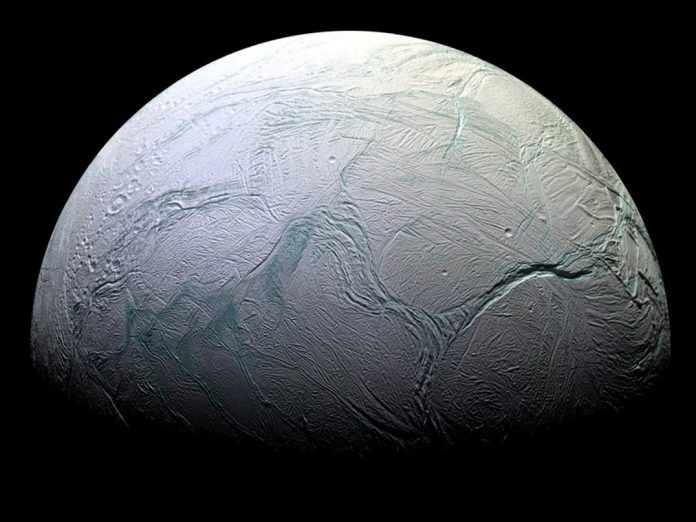Alien life may be thriving in a warm, underground ocean on Saturn’s icy moon Enceladus, according to new research.
Enceladus is less than 1% the size of our moon yet hides an ocean containing up to 10% as much water as exists on Earth. What’s more, chemical studies of water jets shooting out of Enceladus’ south pole suggest the moon’s deep, warm ocean could be “a candy store” for microbes.
No one yet knows if aliens exist in this distant subsurface ocean. However, a study published Monday in the journal Nature Astronomy suggest the moon’s hidden sea of water may be billions of years old — perhaps even as old as Earth’s own oceans.
“This could be good news for the astrobiological potential of Enceladus’s ocean,” Kevin Hand, a planetary scientist at NASA’s Jet Propulsion Laboratory who wasn’t involved in the research, told Business Insider in an email. “We don’t know how long it takes for the origin of life to occur, but more time is probably better.”
Scientists long suspected Enceladus might hide an ocean.
They reasoned radioactive elements could heat up the moon’s rocky core enough to melt surrounding ice. Or maybe Saturn’s gravity — through a process similar to tides on Earth — could knead and heat Enceladus’ rocky core as it orbited the planet. Or perhaps both at once.
However, the existence of Enceladus’ ocean wasn’t confirmed until after the arrival of NASA’s Cassini spacecraft in 2004.
The nuclear-powered probe discovered and flew through the moon’s icy jets, giving scientists a crude “taste” of the water’s other ingredients — including gases that microbes could feed on, salts, and tiny grains of silica rock from the seafloor.
Cassini also gathered more than a decade of data on the moon’s wobble before NASA purposefully destroyed the robot. A 2015 analysis of that wobble signaled the existence of a global subsurface ocean, further raising the chances for life’s foothold below the moon’s icy crust.
What researchers were less certain about is how long the ocean of Enceladus has existed.
On Earth — the only inhabited world we know of — it took nearly a billion years for life to emerge, then billions more to thrive and diversify into plants and animals. (Earth is 4.54 billion years old, and the oldest-known life are fossils of deep-sea hydrothermal vents dating back 3.77 billion years old.)
Knowing that a younger ocean would lower the chances for finding alien life at Enceladus in the future, a group of seven scientists set out to estimate its age.
Measurements of Enceladus and its ocean suggest the moon’s core was about 100 times hotter than heat given off by decaying radioactive elements could explain, according to a European Space Agency press release.
The new study tackled the age of Enceladus’s ocean by taking everything scientists knew about the moon — primarily from Cassini data — and plugging it into 3D simulations. The model explored how much heat tidal friction could generate at the moon’s core, and where it’d go over millions of years.
When the Europe-based research group assumed the moon’s rocky core was more porous than solid (which is the going theory), their simulations showed tidal friction could generate enough heat to form a global ocean.
There was also enough warmth to keep the ocean liquid for tens of millions or perhaps billions of years, according to a NASA-JPL press release. All of the ocean’s water also cycled through Enceladus’ rocky core every 25-250 million years — a process that could bring life-giving chemicals to the surface.
“Long-lived, sustained geothermal activity on Enceladus’s seafloor could spell good news for geochemistry that gives way to biochemistry,” Hand said.
Future missions to Enceladus may be able to determine if hydrothermal vents exist on the moon’s seafloor, according to the ESA, further raising the moon’s profile as a place to seek out alien life.















